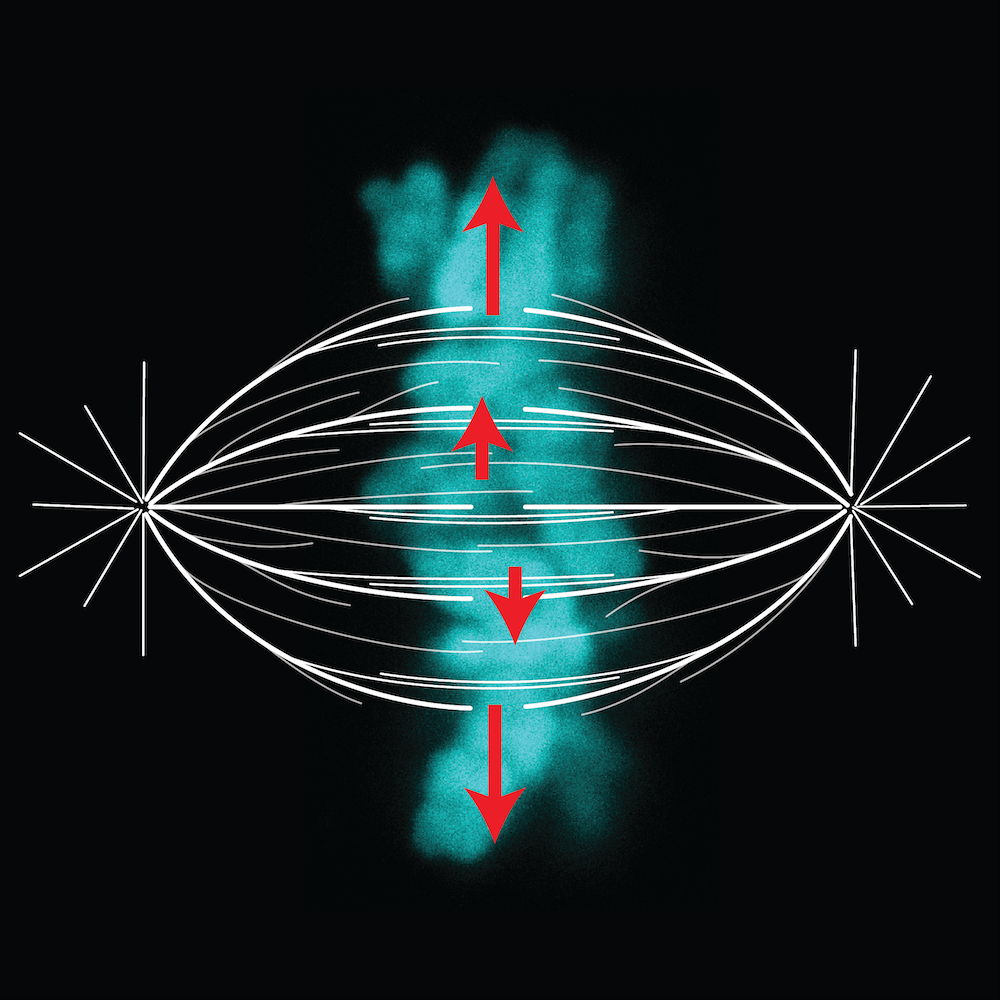Mechanisms of mitotic spindle’s adaptation to different genome sizes
Eukaryotes divide their genome using the mitotic spindle, a molecular micro-machine built upon largely conserved biochemical and biophysical principles.  Regardless of the organism’s complexity, spindles are made up of microtubules, motor proteins, and kinetochores, which align the chromosomes in the metaphase plate. The spindle size varies about 2 orders of magnitude over eukaryotic organisms. In contrast, the genome size covers more than 4 orders of magnitude. This difference in scales, where the genome size differs 100 times more than the spindle size, is the motivation for the main research question of this project: How do the spindles of rather similar size and architecture divide chromosomes from genomes of very different sizes? We propose two conceptually different models, where in the first one spindle size and shape result from chromosome pushing forces within the metaphase plate, whereas in the second one spindle dimensions are set by centrosomal microtubule clamping. To test these models, we will take an interdisciplinary approach encompassing cell biology, advanced microscopy, and biophysical perturbations, with help from theoretical physics. We will perform experiments on human cells to investigate how the spindle dimensions change when the chromosome number is altered by using novel approaches, or when the chromosome stiffness is decreased. We will compress the cells to explore how external force affects the spindle size and shape. Inspired by the experimental results, we will develop a theoretical model to explore the role of chromosome- and microtubule-based forces in setting the spindle geometry. Taking a broader perspective, our preliminary data reveal a spindle scaling law across eukaryotes where the metaphase plate diameter shows a power-law scaling with the genome size. We will use the insights gained here to explain this scaling law and to identify the conserved mechanisms of spindle adaptation to genome size from yeasts to plants and animals.
Regardless of the organism’s complexity, spindles are made up of microtubules, motor proteins, and kinetochores, which align the chromosomes in the metaphase plate. The spindle size varies about 2 orders of magnitude over eukaryotic organisms. In contrast, the genome size covers more than 4 orders of magnitude. This difference in scales, where the genome size differs 100 times more than the spindle size, is the motivation for the main research question of this project: How do the spindles of rather similar size and architecture divide chromosomes from genomes of very different sizes? We propose two conceptually different models, where in the first one spindle size and shape result from chromosome pushing forces within the metaphase plate, whereas in the second one spindle dimensions are set by centrosomal microtubule clamping. To test these models, we will take an interdisciplinary approach encompassing cell biology, advanced microscopy, and biophysical perturbations, with help from theoretical physics. We will perform experiments on human cells to investigate how the spindle dimensions change when the chromosome number is altered by using novel approaches, or when the chromosome stiffness is decreased. We will compress the cells to explore how external force affects the spindle size and shape. Inspired by the experimental results, we will develop a theoretical model to explore the role of chromosome- and microtubule-based forces in setting the spindle geometry. Taking a broader perspective, our preliminary data reveal a spindle scaling law across eukaryotes where the metaphase plate diameter shows a power-law scaling with the genome size. We will use the insights gained here to explain this scaling law and to identify the conserved mechanisms of spindle adaptation to genome size from yeasts to plants and animals.
2024-2027 SPINGEN
Research area: Life Sciences
Researcher: Prof Iva Tolić
Host Institution: Ruđer Bošković Institute (Croatia)
Project: Mechanisms of mitotic spindle’s adaptation to different genome sizes (SpinGen)
HRZZ call: Research Projects (IP-2024-05) HRZZ
HRZZ funding: 199.525,00 EUR

Disclaimer: Any opinions, findings, and conclusions or recommendations expressed in this material are those of the author(s) and do not necessarily reflect the views of Croatian Science Foundation, Ministry of Science and Education and European Commission.